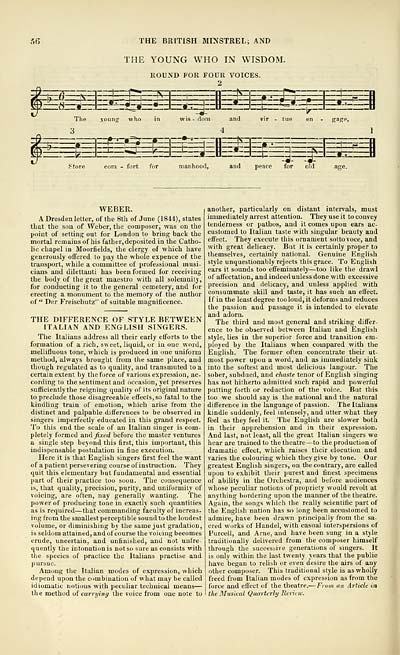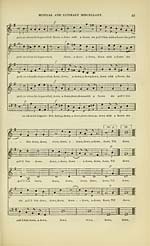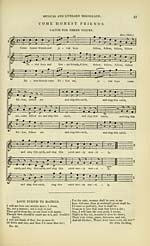Glen Collection of printed music > Printed music > British minstrel, and musical and literary miscellany
(748) Page 56 - Young who in wisdom
Download files
Complete book:
Individual page:
Thumbnail gallery: Grid view | List view

56
THE BRITISH MINSTREL; AND
THE YOUNG WHO IN WISDOM.
ROUND FOR FOUR VOICES.
2
^^^^
I
5s;
The young who in wis - dom
and
vir - tue en
3
iig^
— , — m-i —
^-
tF=^
==i=:
zwr^
:s:
Store
com - fort for manhood, and peace for old
•Jizr
gaRe,
age.
I
WEBER.
A Dresden letter, of the 8th of June (1844), states
that the son of Weber, the composer, was on the
point of setting out for London to bring back the
mortal remains of his father, deposited in the Catho-
lic chapel in Moorfields, the clergy of which have
generously offered to pay the whole expence of the
transport, while a committee of professional musi-
cians and dilettanti has been formed for receiving
the body of the great maestro with all solemnity,
for conducting it to the general cemetery, and for
erecting a monument to the memory of the author
of " Der Freischutz" of suitable magnificence.
THE DIFFERENCE OF STYLE BETWEEN
ITALIAN AND ENGLISH SINGERS.
The Italians address all their early efforts to the
formation of a rich, sweet, liquid, or in one word,
mellifluous tone, which is produced in one uniform
method, always brought from the same place, and
though regulated as to quality, and transmuted to a
certain extent by the force of various expression, ac-
cording to the sentiment and occasion, yet preserves
sufficiently the reigning quality of its original nature
to preclude those disagreeable effects, so fatal to the
kindling train of emotion, which arise from the
distinct and palpable differences to be observed in
singers imperfectly educated in this grand respect.
To this end the scale of an Italian singer is com-
pletely formed aod fixed before the master ventures
a single step beyond this first, this important, this
indispensable postulation in fine execution.
Here it is that English singers first feel the want
of a patient persevering course of instruction. They
quit this elementary but fundamental and essential
part of their practice too soon. The consequence
is, that quality, precision, purity, and uniformity of
voicing, are often, nay generally wanting. The
power of producing tone in exactly such quantities
as is required — that commanding faculty of increas-
ing from the smallest perceptible sound to the loudest
volume, or diminishing by the same just gradation,
is seldom attained, and of course the voicing becomes
crude, uncertain, and unfinished, and not uufre-
quently the intonation is not so sure as consists with
the species of practice the Italians practise and
pursue.
Among the Italian modes of expression, which
depend upon the combination of what may be called
idiomatic notions with peculiar technical means —
the method uf carrying the voice from one note to
another, particularly on distant intervals, must
immediately arrest attention. They use it to convey
tenderness or pathos, and it comes upon ears ac-
customed to Italian taste with singular beauty and
effect. They execute this ornament sotto voce, and
with great delicacy. But it is certainly proper to
themselves, certainly national. Genuine English
style unquestionably rejects this grace. To English
ears it sounds too effeminately — too like the drawl
of affectation, and indeedunless done with excessive
precision and delicacy, and unless applied with
consummate skill and taste, it has such an effect.
If in the least degree too loud, it deforms and reduces
the passion and passage it is intended to elevate
and adorn.
The third and most general and striking differ-
ence to be observed between Italian and English
style, lies in the superior force and transition em-
ployed by the Italians when compared with the
English. The former often concentrate their ut-
most power upon a word, and as immediately sink
into the softest and most delicious langour. The
sober, subdued, and chaste tenor of English singing
has not hitherto admitted such rapid and powerful
putting forth or reduction of the voice. But this
too we should say is the national and the natural
difference in the language of passion. The Italians
kindle suddenly, feel intensely, and utter what they
fbel as they feel it. The English are slower both
in their apprehension and in their expression.
And last, not least, all the great Italian singers we
hear are trained to the theatre — to the production of
dramatic effect, which raises their elocution and
varies the colouring which they give by tone. Our
greatest English singers, on the contrary, are called
upon to exhibit their purest and finest specimens
of ability in the Orchestra, and before audiences
whose peculiar notions of propriety would revolt at
anything bordering upon the manner of the theatre.
Again, the songs which the really scientific part of
the English nation has so long been accustomed to
admire, have been drawn principally from the sa-
cred works of Handel, with casual interspersions of
Purcell, and Arne, and have been sung in a style
traditionally delivered from the composer himself
through the successive generations of singers. It
is only within the last twenty years that the public
have began to relish or even desire the airs of any
other composer. This traditional style is as wholly
freed from Italian modes of expression as from the
force and efl'ect of the theatre. — From an Article in
the Musical Quarterly Renew.
THE BRITISH MINSTREL; AND
THE YOUNG WHO IN WISDOM.
ROUND FOR FOUR VOICES.
2
^^^^
I
5s;
The young who in wis - dom
and
vir - tue en
3
iig^
— , — m-i —
^-
tF=^
==i=:
zwr^
:s:
Store
com - fort for manhood, and peace for old
•Jizr
gaRe,
age.
I
WEBER.
A Dresden letter, of the 8th of June (1844), states
that the son of Weber, the composer, was on the
point of setting out for London to bring back the
mortal remains of his father, deposited in the Catho-
lic chapel in Moorfields, the clergy of which have
generously offered to pay the whole expence of the
transport, while a committee of professional musi-
cians and dilettanti has been formed for receiving
the body of the great maestro with all solemnity,
for conducting it to the general cemetery, and for
erecting a monument to the memory of the author
of " Der Freischutz" of suitable magnificence.
THE DIFFERENCE OF STYLE BETWEEN
ITALIAN AND ENGLISH SINGERS.
The Italians address all their early efforts to the
formation of a rich, sweet, liquid, or in one word,
mellifluous tone, which is produced in one uniform
method, always brought from the same place, and
though regulated as to quality, and transmuted to a
certain extent by the force of various expression, ac-
cording to the sentiment and occasion, yet preserves
sufficiently the reigning quality of its original nature
to preclude those disagreeable effects, so fatal to the
kindling train of emotion, which arise from the
distinct and palpable differences to be observed in
singers imperfectly educated in this grand respect.
To this end the scale of an Italian singer is com-
pletely formed aod fixed before the master ventures
a single step beyond this first, this important, this
indispensable postulation in fine execution.
Here it is that English singers first feel the want
of a patient persevering course of instruction. They
quit this elementary but fundamental and essential
part of their practice too soon. The consequence
is, that quality, precision, purity, and uniformity of
voicing, are often, nay generally wanting. The
power of producing tone in exactly such quantities
as is required — that commanding faculty of increas-
ing from the smallest perceptible sound to the loudest
volume, or diminishing by the same just gradation,
is seldom attained, and of course the voicing becomes
crude, uncertain, and unfinished, and not uufre-
quently the intonation is not so sure as consists with
the species of practice the Italians practise and
pursue.
Among the Italian modes of expression, which
depend upon the combination of what may be called
idiomatic notions with peculiar technical means —
the method uf carrying the voice from one note to
another, particularly on distant intervals, must
immediately arrest attention. They use it to convey
tenderness or pathos, and it comes upon ears ac-
customed to Italian taste with singular beauty and
effect. They execute this ornament sotto voce, and
with great delicacy. But it is certainly proper to
themselves, certainly national. Genuine English
style unquestionably rejects this grace. To English
ears it sounds too effeminately — too like the drawl
of affectation, and indeedunless done with excessive
precision and delicacy, and unless applied with
consummate skill and taste, it has such an effect.
If in the least degree too loud, it deforms and reduces
the passion and passage it is intended to elevate
and adorn.
The third and most general and striking differ-
ence to be observed between Italian and English
style, lies in the superior force and transition em-
ployed by the Italians when compared with the
English. The former often concentrate their ut-
most power upon a word, and as immediately sink
into the softest and most delicious langour. The
sober, subdued, and chaste tenor of English singing
has not hitherto admitted such rapid and powerful
putting forth or reduction of the voice. But this
too we should say is the national and the natural
difference in the language of passion. The Italians
kindle suddenly, feel intensely, and utter what they
fbel as they feel it. The English are slower both
in their apprehension and in their expression.
And last, not least, all the great Italian singers we
hear are trained to the theatre — to the production of
dramatic effect, which raises their elocution and
varies the colouring which they give by tone. Our
greatest English singers, on the contrary, are called
upon to exhibit their purest and finest specimens
of ability in the Orchestra, and before audiences
whose peculiar notions of propriety would revolt at
anything bordering upon the manner of the theatre.
Again, the songs which the really scientific part of
the English nation has so long been accustomed to
admire, have been drawn principally from the sa-
cred works of Handel, with casual interspersions of
Purcell, and Arne, and have been sung in a style
traditionally delivered from the composer himself
through the successive generations of singers. It
is only within the last twenty years that the public
have began to relish or even desire the airs of any
other composer. This traditional style is as wholly
freed from Italian modes of expression as from the
force and efl'ect of the theatre. — From an Article in
the Musical Quarterly Renew.
Set display mode to: Large image | Transcription
Images and transcriptions on this page, including medium image downloads, may be used under the Creative Commons Attribution 4.0 International Licence unless otherwise stated. ![]()
| Special collections of printed music > Glen Collection of printed music > Printed music > British minstrel, and musical and literary miscellany > (748) Page 56 - Young who in wisdom |
|---|
| Permanent URL | https://digital.nls.uk/91443921 |
|---|
| Description | Scottish songs and music of the 18th and early 19th centuries, including music for the Highland bagpipe. These are selected items from the collection of John Glen (1833 to 1904). Also includes a few manuscripts, some treatises, and other books on the subject. |
|---|
| Description | The Glen Collection and the Inglis Collection represent mainly 18th and 19th century Scottish music, including Scottish songs. The collections of Berlioz and Verdi collected by bibliographer Cecil Hopkinson contain contemporary and later editions of the works of the two composers Berlioz and Verdi. |
|---|

